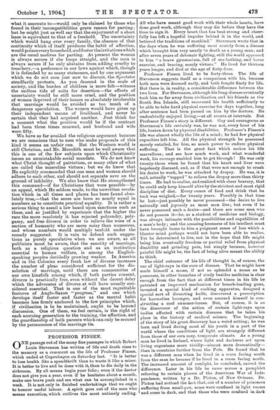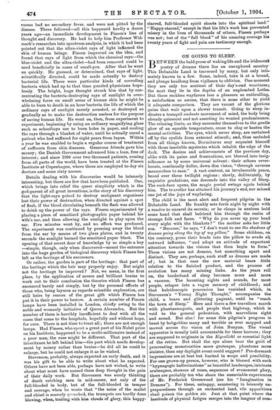O NE passage out of the many fine passages in which
Robert Louis Stevenson has written of life and death rises to the memory as a comment on the life of Professor Finsen, which ended at Copenhagen on Saturday last. "It is better to lose health like a spendthrift than to waste it like a miser. It is better to live and be done with it, than to die daily in the sickroom. By all means begin your folio ; even if the doctor does not give you a year, even if he hesitates about a month, make one brave push and see what can be accomplished in a week. It is not only in finished undertakings that we ought to honour useful labour. A spirit goes out of the man who means execution, which outlives the most untimely ending.
All who have meant good work with their whole hearts, have done good work, although they may die before they have the time to sign it. Every heart that has beat strong and cheer- fully has left a hopeful impulse behind it in the world, and bettered the traditions of mankind." Stevenson wrote that in the days when he was suffering most acutely from a disease which brought him very nearly to death as a young man; and after seven years of debonair fighting, still the world appeared to him "a brave gymnasium, full of sea-bathing, and horse exercise, and bracing, manly virtues." He lived for thirteen years longer, and died at the age of forty-four.
Professor Finsen lived to be forty-three. The life of Stevenson suggests itself as a comparison with his, because both men were doomed early, and both fought finely for life. But there is, in reality, a considerable difference between the two lives. For Stevenson, although his lung-disease eventually took him so far away from civilisation and his friends as the South Sea Islands, still recovered his health sufficiently to be able to take hard physical exercise for days together, long after sentence had been passed on him by the doctors. He undoubtedly enjoyed living,—at all events at intervals. But Professor Finsen's story is different. Gay and courageous as Stevenson's life certainly was, he was not, every hour of his life, beaten down by physical disabilities. Professor's Finsen's life was almost wholly the life of a mind ; he had few physical capacities left him. All the physical strength he possessed merely entailed, for him, so much power to endure physical suffering. That is the great fact which makes his life marvellous ; and see how much work, and what wonderful work, his courage enabled him to get through He was only twenty-three when he found that his heart and liver were hopelessly diseased, and, as if that were not enough to crush his desire to work, he was attacked by dropsy. He was, it is said, actually "tapped" to relieve the dropsy more than thirty times. He had to realise, and realised with sheer bravery, that he could only keep himself alive by the strictest and most rigid discipline of diet. Every ounce of food and drink that he took was weighed,—for twenty years. Possibly in that time he lost—just possibly he never possessed—the desire to live naturally and joyously as most men live; but even if he never possessed such a desire—and there are some men who do not possess it—he, as a student of medicine and biology, was always intimate with the possibilities and capabilities of a man's body ; and the amazing keenness of his intellect must have brought home to him a poignant sense of loss which a blunter mind perhaps would not have been able to realise. Yet he determined to live, not in the hope that life might bring him eventually freedom or partial relief from physical disability and grinding pain, but simply because, however painful life might be, the fact of being alive meant the ability to think.
The chief outcome of his life of thought is, of course, the use of light-rays in the cure of disease. That he might have made himself a name, if not so splendid a name as he possesses, in other branches of study besides medicine is clear enough from the fact that at different times in his life he patented an improved mechanism for breech-loading guns, invented a special kind of cooking apparatus, designed a special sort of dissecting knife, discovered a prescription for haematine lozenges, and even amused himself in con- structing a cool summer-house. But, of course, it is as the discoverer of the action of certain light-rays upon bodies affected with certain diseases that he takes his place in the history of medical science. The beginning of the story of his great discovery has a weird setting; he was born and lived during most of his youth in a part of the world where the conditions of light are strangely different from those of our own easy, temperate climate. As a young man he lived in Iceland, where light and darkness act upon living organisms more vividly—almost more dramatically— than in countries further from the Pole. He found that he was a different man when he lived in a room facing south from the man he became if he lived in a room facing north. The increased amount of sunlight, lie concluded, caused the difference. Later in his life he came across a pamphlet referring to certain phases of the American War of Inde- pendence, written by a Dr. Picton, of New Orleans. Dr. Picton had noticed the fact that, out of a number of prisoners suffering from small-pox, some were confined in light rooms and some in dark, and that those who were confined in dark
rooms had no secondary fever, and were not pitted by the disease. There followed—all this happened hardly a dozen years ago—an immediate development in Finsen's line of thought and discovery. He had to help him Professor Wid- mark's researches into spectrum analysis, in which it had been pointed out that the ultra-violet rays of light inflamed the skin of human beings. Finsen improved on the idea, and found that rays of light from which the chemical rays—the blue-violet and the ultra-violet—had been removed could be used beneficially in cases of small-pox. After that he went on quickly. He guessed, or determined, that rays of light, scientifically directed, could be made actually to destroy bacterial life. There were particular kinds of corroding bacteria which had up to that time puzzled physicians hope- lessly. The bright, huge thought struck him that by con- centrating the bacteria-destroying rays of sunlight in over- whelming force on small areas of human skin he might be able to burn to death in an hour bacteria the life of which the ordinary rays of sunlight merely arrested, or destroyed so gradually as to make the destruction useless for the purpose of saving human life. He went on, then, from experiment to experiment, beginning by using an ordinary magnifying glass such as schoolboys use to burn boles in paper, and cooling the rays through a blanket of water, until he actually cured a patient who had suffered for eight years from lupus. Within a year he was enabled to begin a regular course of treatment of sufferers from skin diseases. Generous friends gave him money; the Danish Government advanced him a loan, free of interest; and since 1896 over two thousand patients, coming from all parts of the world, have been treated at the Finsen Institute at Copenhagen, where there are employed to-day six doctors and some sixty nurses.
Details dealing with his discoveries would be intensely interesting, but there are few that have been published. One, which brings into relief the queer simplicity which is the god-parent of all great inventions, is the story of his discovery that the light-rays poised to destroy malignant organisms lost their power of destruction, when directed against a spot of flesh, if the blood circulating beneath the flesh was allowed to drink up the power of the rays. Finsen experimented by placing a piece of sensitised photographic paper behind his wife's ear, and then allowing the sunlight to play upon the ear. Five minutes went by, and no effect was produced. The experiment was continued by pressing away the blood from the ear by means of two glass plates, and in twenty seconds the sunlight burned the sensitised paper black. The opening of that secret door of knowledge by so simple a key —simple, though, only when discovered—meant the entrance into the huge garden of biological discovery which Finsen has left as the heritage of his successors.
Or rather, the garden is part of the heritage : that part of the heritage which the heir may properly enjoy. But might not the heritage be improved ? Not, we mean, in the first place, by the application of severe and brilliant brains to work out to their conclusion the theories which Finsen has enounced barely and simply, but by the personal efforts of those who, being laymen as regards scientific exploration, are still heirs by reason of the great gift which Finsen has put it in their power to bestow. A certain number of Finsen lamps have been installed in London, chiefly owing to the noble and womanly initiative of Queen Alexandra. But the number of them is horribly insufficient to deal with all the cases that come to the hospitals, hopefully and without hope, for cure. There is not time to treat all ; there are not enough lamps. Had Finsen, who spent a great part of his Nobel prize on his Institute, happened to be a multi-millionaire instead of a poor man, the case might be different. That part of the inheritance he left behind him—the part which needs develop- ment by money rather than brains—be did all he could to enlarge, but he could not enlarge it as he wished.
Stevenson, probably, always expected an early death, and it was his gift to be able to write about what he expected. Others have not been able, perhaps have not wished, to write about what must have caused them deep thought in the pain of their daily work. But Stevenson was surely thinking of death catching men in mid-career, not only of the full-blooded in body, but of the full-blooded in temper and courage, when he wrote that "the noise of the mallet and chisel is scarcely quenched, the trumpets are hardly done blowing, when, trailing with him clouds of glory, this happy-
starred, full-blooded spirit shoots into the spiritual land." "Happy-starred," except in that his life's work has prevented misery in the lives of thousands of others, Finsen perhaps was not ; but of the "full blood" of his amazing courage his twenty years of fight and pain are testimony enough.























































 Previous page
Previous page